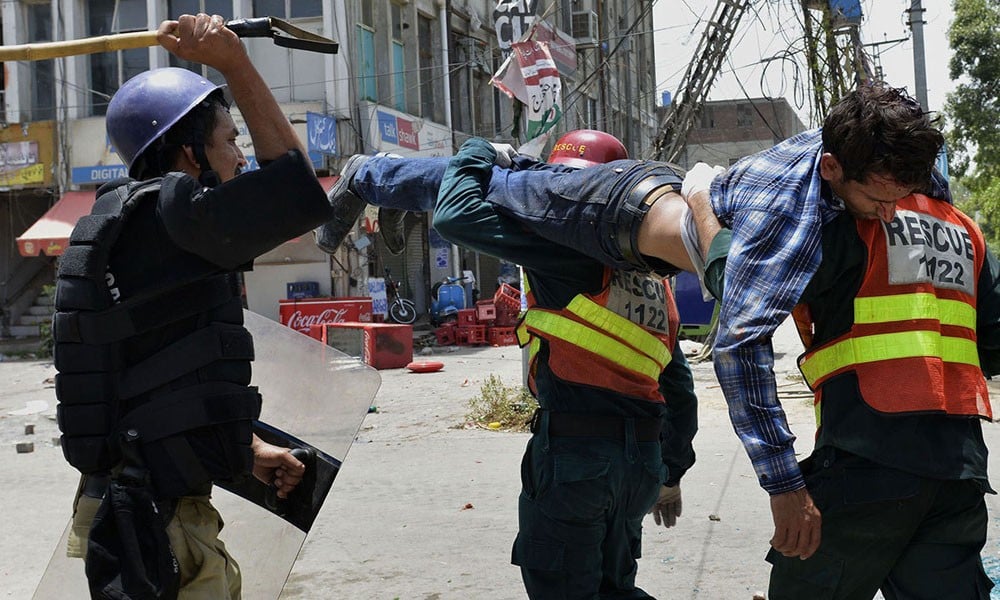
Is it possible to get rid of the Thaana culture?

The reputation, functioning, effectiveness of policing and law and order in Punjab is built around the office of the Station House Officer (SHO). The lineage of the position of SHO can be traced back from the Mughal era when in many towns, administration of the police was entrusted to ‘Kotwals’-- who had a greater responsibility and discharged the combined duties of law enforcement, municipal administration and revenue collection. These functions have undergone changes.
Today, Punjab has an estimated population of about 100 million and it has 686 police stations with 100 model police stations. In Lahore, there are 82 police stations; and out of these about 40 police stations do not have their own buildings. They are built on a rented facility or an old house with no furniture and infrastructure. Most of the office furniture is procured by officials working there on personal expense or self-generated ‘magic money’.
A police station is headed by an SHO; the SHO is usually an officer of the rank of an inspector (BPS-16) or a sub-inspector (BPS-14) depending on the area where they are posted. Section 4 of the CrPC (Code of Criminal Procedure) empowers the officer in-charge of a police station to conduct and perform such duties within the limits of the jurisdiction of his police station: record the F.I.R, check the crime rate and apprehend and bring offenders to justice. Along with this, an SHO is the responsible authority for the registration of First Information Report (FIR) in accordance with the Section 154 of the Criminal Procedure (CrPC) once a cognisable offence is committed.
In the line of duty, the SHO is also expected to perform multifarious tasks, such as keeping a check on price in Sunday Bazar or Ramzan Bazar and providing security to political processions or rallies etc. The Police Order 2002 separated investigation and watch/ward at the ‘Thaana’ level, however, this was rescinded through amendments in Article 18 of Police Order 2002 and the investigation wing was placed under the general command and control of the SHO at the police station level.
Crime, torture, corruption and rude behaviour have become synonymous with the SHO. Such a reputation compromises the authority of the Police Station -- Thaana and the SHO. Understandably not all SHOs are corrupt but this perception persists. During the course of our study, in an interview, a senior bureaucrat said, "Only that subordinate officer is appointed as SHO, who has the ability to generate funds and can bear the monthly expense of a police station." It was alarming to learn that a Thaana, having a staff of about 40 policemen on average was expected to generate revenue of about Rs200,000 monthly from its own ‘sources’ to bear the running cost of a police station. The government provides only Rs50,000 a month and that too only to a model police station. Thus, extortion and rent-seeking is embedded in the ‘Thaana and SHO’ culture. Is it possible to arrest this process?
Although budget is allocated for the maintenance and operational cost of policing, it is never disbursed to the relevant police stations. Hence, police stations are running on ‘self-generated funds’ and the element of corruption is imbedded due to this flaw in policy. Equally important, stationery and maintenance allowances are not given to police stations and invariably the SHO has to procure the stationery and furniture and carry out the maintenance of the police stations.
To improve the governance and efficacy of policing, there is a growing consensus among experts and lawmakers that police reform must focus on SHOs and police stations. The critical question is how to streamline the process through which an SHO is selected. This demands transparency, competition and fairness in selection. Recruitment is generally done at constable and ASI level -- constables are now recruited through NTS and ASIs are recruited through PPSC. Through promotion one is promoted to the rank of inspector, who is usually made an SHO.
An SHO has to be experienced, skilful and know how to handle difficult situations in the field. There is no proper training specified for SHOs. While focusing on police reforms, it is imperative to have a proper training mechanism for SHOs.